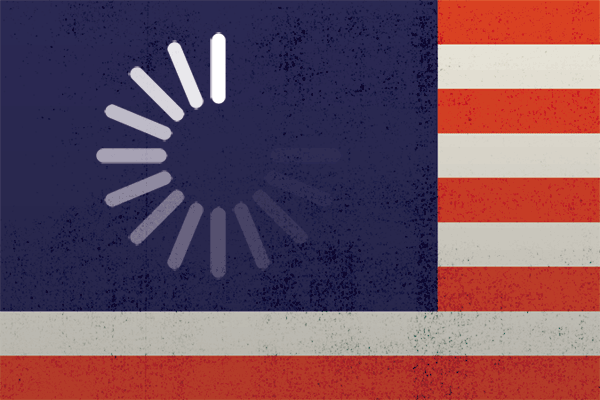
In our previous article, we spoke about how most gamified dApps are actually pretty bad. They’re either just thinly-veiled token exchanges or boring gambling sites, whilst the few making actual games with real gameplay simply use the ‘blockchain’ epithet to sell themselves as being unique.
No one seems to be using the tech for anything truly revolutionary.
Rather than just complaining, we felt we should come up with some ideas for developers out there who want to make something worthwhile.
The US Government has reportedly blocked League of Legends in the recalcitrant nations of Syria and Iran. Perhaps they hope to punish the beleaguered youth of these countries for their lack of faith in Freedom.
 Freedom is loading.
Freedom is loading.Plenty have circumvented the ban by accessing Riot’s servers through VPNs, but everyone knows VPN connections are murderous when it comes to quality of online play.
Luckily, we possess a technology that allows us to build a game on decentralised networks that are highly resistant to wholesale restriction.
In the halcyon days of Warcraft 3, home servers meant all you needed was a copy of the game if you wanted to play online - the copy didn’t even need to be validated or legal, as third-party software like Hamachi could subsitute Battle.net if you didn’t want to pay for anything.
If Blizzard didn’t like you, they couldn’t do much more than ban you from their mainstream network, leaving a whole world of custom networks out there for you to log onto instead.

The idea here would be to distribute server workloads across the entire blockchain network (or to nodes qualified by security and hashpower, and perhaps geographic variety), therefore eliminating the ability for a central authority to cut access from a single domain, as the network would ostensibly belong to global spread of its participants.
Every step of involvement would belong to you, the player. Connection, server and client.
Whether the tech is fast enough to support games like LoL is another matter. As explicated by Ethereum co-founder Vitalik Buterin, block speeds and sizes greatly affect the security of the network and largely determine its use suitability, so proper calibration is a big part of network construction.
It wouldn't be possible to run a full-scale multiplayer platform processing thousands of games on the same lethargic block speeds possessed by Bitcoin, for example.
Hopefully, the idea of outsourcing server costs would attract developers looking to build a game with low capital investment. High performance servers are expensive: WoW is thought to have cost about $130k a day in 2010, near its peak.
Because the game network would be public yet anonymised, it becomes much easier to utilise user-generated data, and this is where the gameplay possibilities magnify. All sorts of fun mechanics can be built on this data, such as persistent and self-referential records of all player activity which, because they’re public, could fuel player-made mods that would otherwise have never been possible.

'Blockchain’ isn’t a feature, it’s a mechanism for overcoming the problems associated with centralised servers. There’s nothing fun about it; what we DO with the tech is where the fun lies.
19.88$ has been spent to promote this content using Steemium.
Learn more here!
Great post! I'm very excited to see where we end up with block chain gaming in the near future.
Talking about the old days got me feeling really nostalgic, I used to run Counter Strike servers back on patches 1.5 and 1.6, that's even before Steam existed, let alone all the CS games that came out since!
It's unlikely that any AAA developers will embrace blockchain tech in a way that will limit their control over their IPs. Blizzard famously refused to give offline play to SC2 because they wanted to maintain a tight grip over the burgeoning e-sports scene; the global trend is increasing centrality, largely for financial reasons. Indie devs on the other hand will give us something unique, but that also means suffering the deluge of low budget pixelated side-scrollers until the tech has been worked out.